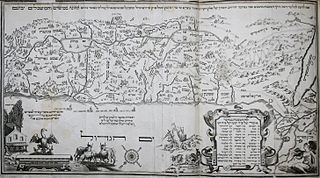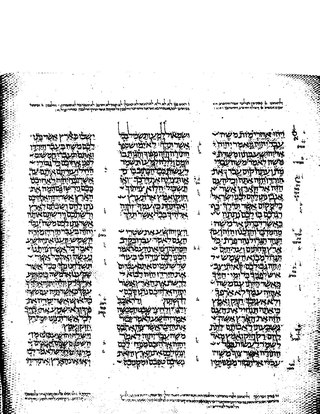Related Research Articles

David was, according to the Hebrew Bible, the third king of the United Kingdom of Israel.

The Kingdom of Judah was an Israelite kingdom of the Southern Levant during the Iron Age. Centered in the highlands of Judea, the landlocked kingdom's capital was Jerusalem. Jews are named after Judah and are primarily descended from it.
The Nevi'im is the second major division of the Hebrew Bible, lying between the Torah ("instruction") and Ketuvim ("writings"). The Nevi'im are divided into two groups. The Former Prophets consists of the narrative books of Joshua, Judges, Samuel and Kings; while the Latter Prophets include the books of Isaiah, Jeremiah, Ezekiel, and the Twelve Minor Prophets.

The Ayalon Valley, also written Aijalon and Ajalon, is a valley in the lowland of the Shephelah in Israel.

According to the Hebrew Bible, the Tribe of Ephraim was one of the tribes of Israel. The Tribe of Manasseh together with Ephraim formed the House of Joseph. It is one of the ten lost tribes. The etymology of the name is disputed.

The Tribe of Dan was one of the twelve tribes of Israel, according to the Torah. They were allocated a coastal portion of land when the people of Israel entered the Promised Land, later moving northwards.

Baasha was, according to the Hebrew Bible, the third king of the northern Israelite Kingdom of Israel. He was the son of Ahijah of the Tribe of Issachar. Baasha's story is told in 1 Kings 15:16–16:7.
Geba was a city mentioned in the Hebrew Bible.

Israel Finkelstein is an Israeli archaeologist, professor emeritus at Tel Aviv University and the head of the School of Archaeology and Maritime Cultures at the University of Haifa. Finkelstein is active in the archaeology of the Levant and is an applicant of archaeological data in reconstructing biblical history. He is also known for applying the exact and life sciences in archaeological and historical reconstruction. Finkelstein is the current excavator of Megiddo, a key site for the study of the Bronze and Iron Ages in the Levant.

Nadab was, according to the Hebrew Bible, the second king of the northern Israelite Kingdom of Israel. He was the son and successor of Jeroboam.

According to the Deuteronomistic history in the Hebrew Bible, a United Monarchy or United Kingdom of Israel existed under the reigns of Saul, Eshbaal, David, and Solomon, encompassing the territories of both the later kingdoms of Judah and Israel.

Gath or Gat was one of the five cities of the Philistine pentapolis during the Iron Age. It was located in northeastern Philistia, close to the border with Judah. Gath is often mentioned in the Hebrew Bible and its existence is confirmed by Egyptian inscriptions. Already of significance during the Bronze Age, the city is believed to be mentioned in the El-Amarna letters as Gimti/Gintu, ruled by the two Shuwardata and 'Abdi-Ashtarti. Another Gath, known as Ginti-kirmil also appears in the Amarna letters.

Zimri, was the fifth king of Israel. His reign lasted only seven days. William F. Albright has dated his reign to 876 BCE, while E. R. Thiele offers the date 885 BCE. His story is told in 1 Kings, Chapter 16.
Gabatha and Gabathōn are the graecised forms of Semitic words for 'hill' or 'elevation', used as toponyms or parts thereof in the Hellenised Land of Israel/Palestine region and found as such in the Onomasticon written by Eusebius of Caesarea in the 4th century.

According to the First Book of Kings and the Second Book of Chronicles of the Hebrew Bible, Jeroboam's Revolt was an armed insurrection against Rehoboam, king of the United Monarchy of Israel, and subsequently the Kingdom of Judah, led by Jeroboam in the late 10th century BCE. The conflict, referring to the independence of the Kingdom of Samaria and the subsequent civil war during Jeroboam's rule, is said to have begun shortly after the death of Solomon lasting until the Battle of Mount Zemaraim. The conflict began due to discontent under the rule of Solomon's successor, his son Rehoboam, and was waged with the goal of breaking away from the United Monarchy of Israel. Though this goal was achieved very early on in the conflict, the war continued throughout the duration of Rehoboam's reign and well into the reign of his son, Abijam, who defeated the armies of Jeroboam but failed to reunite the kingdoms.

1 Kings 15 is the fifteenth chapter of the Books of Kings in the Hebrew Bible or the First Book of Kings in the Old Testament of the Christian Bible. The book is a compilation of various annals recording the acts of the kings of Israel and Judah by a Deuteronomic compiler in the seventh century BCE, with a supplement added in the sixth century BCE. 1 Kings 12:1-16:14 documents the consolidation of the kingdoms of northern Israel and Judah. This chapter focusses on the reigns of Abijam and Asa in the southern kingdom, as well as Nadab and Baasha in the northern kingdom.

1 Kings 16 is the sixteenth chapter of the Books of Kings in the Hebrew Bible or the First Book of Kings in the Old Testament of the Christian Bible. The book is a compilation of various annals recording the acts of the kings of Israel and Judah by a Deuteronomic compiler in the seventh century BCE, with a supplement added in the sixth century BCE. 1 Kings 12:1-16:14 documents the consolidation of the kingdoms of northern Israel and Judah. This chapter focusses on the reigns of Baasha, Elah, Zimri, Omri and Ahab in the northern kingdom during the reign of Asa in the southern kingdom.
War in the Hebrew Bible concerns any military engagement narrated or discussed in the Hebrew Bible, also known as the Tanakh or Old Testament of the Bible. Texts about war in the Hebrew Bible are part of the broader topic of The Bible and violence. They cover a wide range of topics from detailed battle reports including weapons and tactics used, numbers of combatants involved, and casualties experienced, to discussions of motives and justifications for war, the sacred and secular aspects of war, descriptions and considerations of what in modern times would be considered war crimes such as genocide or wartime sexual violence, and reflections on wars that have happened, or predictions, visions or imaginations of wars that are yet to come.

Joshua 19 is the nineteenth chapter of the Book of Joshua in the Hebrew Bible or in the Old Testament of the Christian Bible. According to Jewish tradition the book was attributed to the Joshua, with additions by the high priests Eleazar and Phinehas, but modern scholars view it as part of the Deuteronomistic History, which spans the books of Deuteronomy to 2 Kings, attributed to nationalistic and devotedly Yahwistic writers during the time of the reformer Judean king Josiah in the 7th century BCE. This chapter records the further allotment of land for the tribes of Israel, especially the tribes of Simeon, Zebulun, Issachar, Asher, Naphtali and Dan, as well as Joshua's Inheritance, a part of a section comprising Joshua 13:1–21:45 about the Israelites allotting the land of Canaan.
References
- ↑ Joshua 19:44; Joshua 21:23; Gibbethon is not mentioned in the parallel list of Levitical cities in the first Book of Chronicles: 1 Chronicles 6:54–81
- ↑ 1 Kings 15:27–31
- 1 2 Blunt, J. J. (1882). Undesigned Coincidences in the Writings both of the Old and New Testaments, quoted in Pulpit Commentary : 1 Kings 15. Accessed via biblehub.com, 21 September 2015
- ↑ Mazar, B., The Cities of the Territory of Dan, Israel Exploration Journal, Vol. 10, No. 2 (1960), pp. 65-77
- ↑ Spivak, Polina: "Tel Malot: Final Report." Hadashot Arkheologiyot: Excavations and Surveys in Israel, vol. 129, 2017, p.1-11